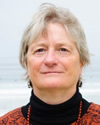 Lisa Tauxe |
2014 Day Medal
Presented to Lisa Tauxe
Citation by Dennis V. Kent
Lisa Tauxe is a preeminent researcher and educator in the field of Earth magnetism. Her research has focused on the behavior of Earth’s magnetic field and its changing intensity and dispersion through time and space. She was the leader of the Time Averaged Field Initiative (TAFI), a multi-institutional collaborative project to obtain a precise and accurate description of the geomagnetic field from volcanic rocks, its most reliable recorders. Better knowledge of properties of the ancient geomagnetic field has already been incorporated in a new statistical model she developed as the lead proponent for correcting inclination error in sediments, which will lead to more precise reconstructions of paleogeography and paleoclimates. This represents a major advance and will change the way we interpret paleomagnetic data. Lisa’s first paper as a graduate student was a sole-authored Nature paper that dealt with a revision of the age of Miocene hominoids in Asia based on revised magnetostratigraphic correlations in the Siwaliks, on which she has written numerous additional papers. Also as a graduate student she went out on DSDP Leg 73 and produced a superb magnetostratigraphy for virtually the entire Cenozoic that confirmed in detail the sequence obtained at Gubbio and led to the development of integrated magnetobiostratigraphic time scales, toward which she continues to make important contributions.
But judging by her citation record (h-index=45 according to the Web of Science), Lisa has clearly become very widely acclaimed for her work on paleointensity, a property of the geomagnetic field that is difficult to measure but critical to our understanding of its generation and long-term evolution of Earth’s dynamo. She followed two research avenues – relative paleointensity in sediments, where she was able to significantly improve data reliability by developing the rigorous pseudo-Thellier technique, and the pioneering use of submarine basaltic glasses that turn out to be an ideal material for classical Thellier methods. Some important outcomes of this work are that the mean long-term value for Earth’s field intensity may only be about one-half of what had been assumed and intriguingly, that there may be a dependency of the mean field intensity on polarity interval length. She is clearly the world’s foremost expert on the rigorous use of quantitative methods to determine paleointensity.
Lisa has established a world-class magnetics research facility at UCSD-Scripps, where she is now a Distinguished Professor and has nurtured a dozen PhD students and mentored a steady stream of post-doctoral scholars over the past 30 years during which she has also maintained her part of a two-career household that included two sons. Lisa is a Fellow of the American Association for the Advancement of Science, the American Geophysical Union, and the Geological Society of America, as well as recipient earlier this year of the Benjamin Franklin Medal of the Franklin Institute. Please join me in congratulating her as this year’s Arthur L. Day Medalist.
 2014 Day Medal — Response by Lisa Tauxe
2014 Day Medal — Response by Lisa Tauxe
I recently became the first woman department chair at Scripps and have noticed that women tend to leave without a phD at a higher rate than men. I’ve been trying to figure out why and so I naturally have reflected on my own journey - especially at the moments when someone or something answered the question, ‘should I stay or should I go?’.
Two people in particular were absolutely pivotal, Neil Opdyke and Dennis Kent. As a second child with a brainy older brother, I have always chosen the ‘class clown’ style rather than the ‘know-it-all’ style, but Neil saw through my clown act somehow. I think he was the first to recognize that I had some talent although i’ve always been convinced that he over-estimated my capabilities. He forgave my many mistakes and talked me out of quitting more than once. Dennis took my meager efforts at science and helped turn them into interesting and provocative papers. Dennis doesn’t tolerate anything less than the very best and sent me many times back to the drawing board. He taught me scholarship and a love of scientific argument.
I have also been blessed with a supportive and tolerant family. My parents made it clear that girls could achieve whatever they were willing to work for. I was really lucky to have met my best friend and husband of 31 years, Hubert Staudigel; we raised two wonderful boys who cheerfully participated in field expeditions. We took the phrase “Drill baby drill” literally.
I have had many inspiring colleagues, students and post-docs at Scripps. Cathy Constable and Jeff Gee, in particular have taught me much. I am profoundly grateful for their friendship, help and support over the years.
So I stand here today profoundly grateful for the chance I was given. Paleomagnetists occupy an odd corner of Earth science nestled between geology and geophysics. We are viewed at times with suspicion or amusement. But it is fun and I never would have made it in stand up comedy anyway. For better or worse, I chose this business and I am doing my best to help other women make the choices that are right for them. If science is your talent, then ‘you go girl’.
